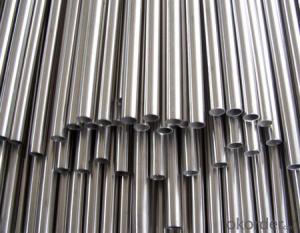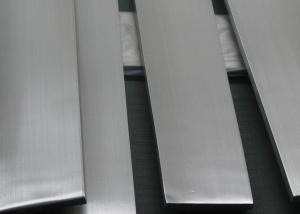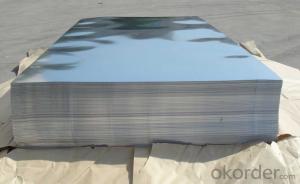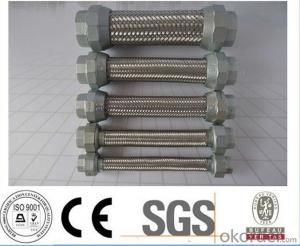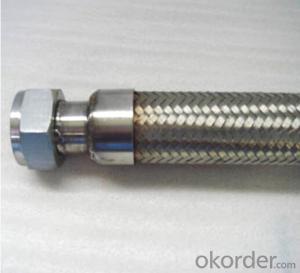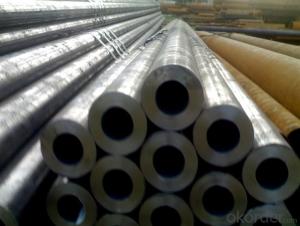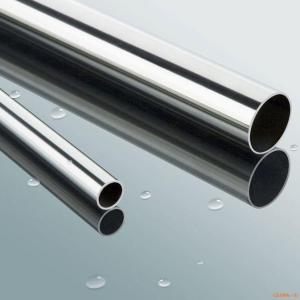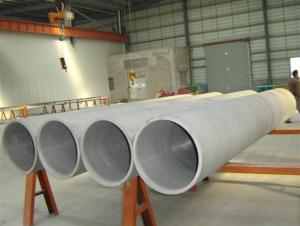Boiler Heat Exchange Stainless Steel Pipe
- Loading Port:
- Tianjin
- Payment Terms:
- TT OR LC
- Min Order Qty:
- 100 m.t.
- Supply Capability:
- 3000 m.t./month
OKorder Service Pledge
OKorder Financial Service
You Might Also Like
Product Description:
1、Structure of Boiler Heat Exchange Stainless Steel Pipe 31803 ASTM A213 Description:
Boiler Heat Exchange stainless steel pipe is often used in the heating system. Heating system, or those stored energy (such as solar energy) in the form of heat, need to be built with the material that can withstand temperatures up to 550 degrees Celsius. High chromium molybdenum welded steel pipe can work in the extreme, which maintain as the ideal material for the construction of power station.
2、Main Features of Boiler Heat Exchange Stainless Steel Pipe 31803 ASTM A213:
• High manufacturing accuracy
• High strength
• Small inertia resistance
• Strong heat dissipation ability
• Good visual effect
•Reasonable price
3、Boiler Heat Exchange Stainless Steel Pipe 31803 ASTM A213 Images:
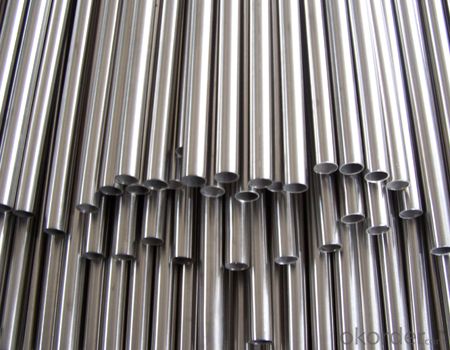
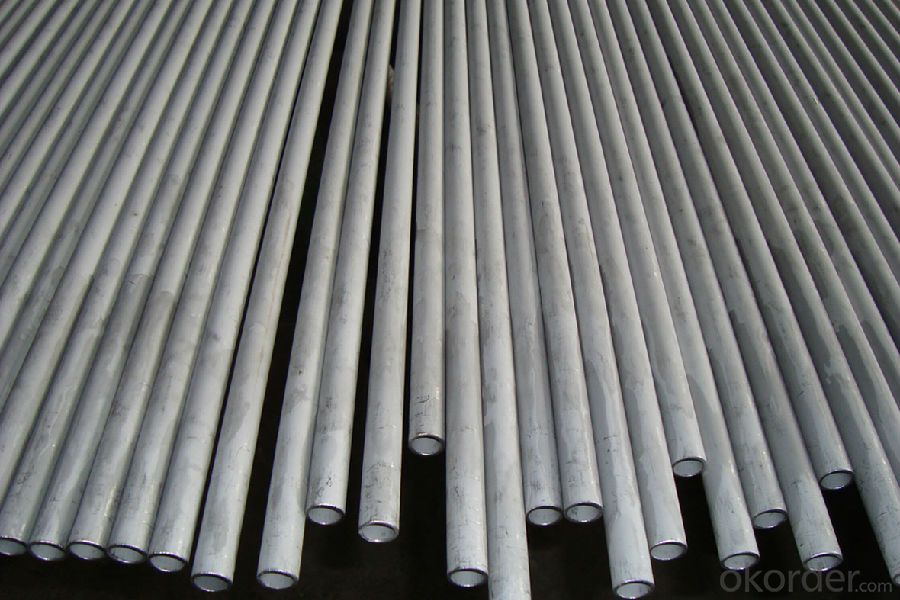
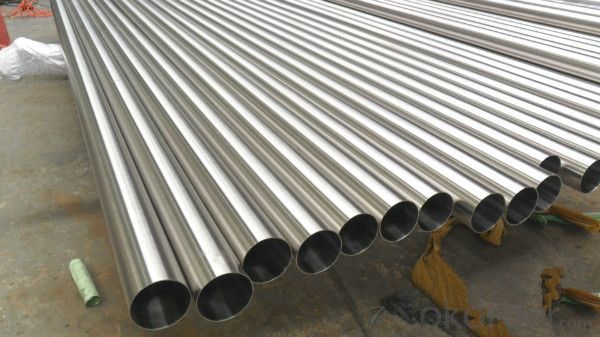
4、Boiler Heat Exchange Stainless Steel Pipe 31803 ASTM A213 Specification:
1)Commodity: heat exchanger pipe
2))Material: 304,316L,304L,316,321,310S,etc
3)Thickness:0.5-100mm
4)Length: 1-14m
| Material Grade | 304,304L,316 ,316L,321,310S,2205,904and so on. |
| Standard | ASTM A312, A554, A249, A269 and A270,ect |
| DIN 17456-85 , DIN 17458-85, DIN 17459-92,ect | |
| JIS G3446-1994, JIS G3448-1997, JIS G3459-1997, JIS G3463-1994,ect | |
| GB13296-1991, GB14975-2002, GB14976-2002,ect | |
| Outer Diameter | 13.7-2020mm |
| Thickness | 0.5-50mm |
| Length | 1m -12m or as customers' request |
| Polish | 180G, 320G, 400G Satin / Hairline |
| 400G, 500G, 600G or 800G Mirror finish | |
| Test | eddy current inspection, ultrasonic inspection, X-ray inspection, real-time imaging, hydrostatic test, spectral analysis, intergranular corrosion, water pressure test, and mechanical property testing facilities. |
| Payment | 1) by L/C at sight, |
| 2) 30% deposit, 70% balance before Shipping. | |
| Delivery time | A.7 days if this goods is stock goods. |
| B.25 days if this goods will be produced after order | |
| Validity | Valid time is 3 days for price usually. |
| Payment terms | FOB QINGDAO |
| MOQ | 1 ton |
| Capacity | 1000 ton per month |
| Certificate | ISO, SGS, and third part inspection |
| Applications | the products are widely used in chemical industry, condenser pipe, heat exchanger, petroleum, shipping military, environment protection, high temperature resistant, low temperature resistant, corrosion resistant and so on. |
| packing details | 1) Wooden-box Package. 2) The Wooden Frame Packing. 3) Intertexture Cloth Packaging with the Iron Sheet Bonding and the Two Terminals Covered With Plastic Dome. |
5、FAQ of Boiler Heat Exchange Stainless Steel Pipe 31803 ASTM A213:
①How is the quality of your products?
Our products are manufactured strictly according to national and internaional standard, and we take a test on every pipe before delivered out. If you want see our quality certifications and all kinds of testing report, please just ask us for it.
Guaranteed: If products’ quality don’t accord to discription as we give or the promise before you place order, we promise 100% refund.
②How about price?
Yes, we are factory and be able to give you lowest price below market one, and we have a policy that “ for saving time and absolutely honest business attitude, we quote as lowest as possible for any customer, and discount can be given according to quantity”,if you like bargain and factory price is not low enough as you think, just don’t waste your time.Please trust the quotation we would give you, it is professional one.
③Why should you chose us?
Chose happens because of quality, then price, We can give you both.Additionally, we can also offer professional products inquiry, products knowledge train(for agents), smooth goods delivery, exellent customer solution proposals.Our service formula: good quality+good price+good service=customer’s trust
SGS test is available, customer inspection before shipping is welcome, third party inspection is no problem.
Any question, pls feel free to contact us !
- Q:Are stainless steel pipes suitable for water treatment plants?
- Yes, stainless steel pipes are suitable for water treatment plants. Stainless steel is a corrosion-resistant material that can withstand the harsh conditions found in water treatment plants, including exposure to chemicals, high temperatures, and high pressure. It is highly durable and has a long lifespan, reducing the need for frequent replacements. Stainless steel pipes also have a smooth inner surface, which prevents the build-up of deposits and promotes efficient flow of water. Additionally, stainless steel is hygienic and does not leach harmful substances into the water, ensuring the quality and safety of the treated water.
- Q:How do stainless steel pipes differ from other types of pipes?
- Stainless steel pipes differ from other types of pipes primarily due to their corrosion-resistant properties, which make them highly durable and long-lasting. Unlike other pipes, stainless steel pipes are less prone to rusting or corroding, making them suitable for a wide range of applications, particularly in industries where hygiene and cleanliness are essential. Additionally, stainless steel pipes have high strength and heat resistance, making them capable of withstanding extreme temperatures and pressures, making them a preferred choice for various industrial and commercial applications.
- Q:Can stainless steel pipes be used for underground gas pipelines?
- Yes, stainless steel pipes can be used for underground gas pipelines. Stainless steel is highly resistant to corrosion and can withstand the harsh underground conditions, making it a suitable choice for gas pipelines.
- Q:Are stainless steel pipes resistant to chlorine corrosion?
- Stainless steel pipes have a general resistance against chlorine corrosion. The corrosion resistance of stainless steel is widely acknowledged, especially when it comes to chlorine and chlorinated water. This is because stainless steel contains high levels of chromium, which generates a protective oxide layer on the metal's surface. This layer acts as a barrier, shielding the stainless steel from the corrosive effects of chlorine. Nonetheless, it is crucial to consider that the degree of resistance to chlorine corrosion can vary based on the specific grade of stainless steel employed. Thus, it is vital to carefully choose the appropriate stainless steel grade that is specifically designed to withstand chlorine corrosion when utilizing stainless steel pipes in applications involving chlorinated water or chlorine-rich environments.
- Q:Can stainless steel pipes be used for sewage disposal?
- Yes, stainless steel pipes can be used for sewage disposal. Stainless steel is highly resistant to corrosion, making it a suitable material for sewage pipes that are exposed to various chemicals and moisture. Additionally, stainless steel pipes have smooth surfaces, which helps prevent the buildup of debris and facilitates the flow of sewage.
- Q:What is the standard size range for stainless steel pipes?
- The standard size range for stainless steel pipes varies depending on the industry and application. However, in general, stainless steel pipes are available in a wide range of sizes, starting from small diameters of around 0.5 inches (12.7 mm) to large diameters of up to 48 inches (1219 mm) or even larger in some cases. The wall thickness of stainless steel pipes can also vary, ranging from thin-walled pipes with a thickness of a few millimeters to heavy-walled pipes with thicknesses exceeding an inch. The specific size range for stainless steel pipes may be determined by factors such as the intended use, pressure requirements, and industry standards. It is important to consult relevant specifications and standards to determine the appropriate size range for a specific application.
- Q:Can stainless steel pipes be used for brewery equipment?
- Yes, stainless steel pipes can definitely be used for brewery equipment. Stainless steel is a preferred material in brewery setups due to its excellent corrosion resistance, durability, and hygienic properties. It can handle the high temperatures, acidic content, and frequent cleaning required in brewery operations, making it a reliable choice for the construction of pipes used in brewing equipment.
- Q:Can stainless steel pipes be used for brewery and beverage industry applications?
- Stainless steel pipes are suitable for use in brewery and beverage industry applications. This material is renowned for its exceptional corrosion resistance and hygienic properties, making it an ideal option for these sectors. The presence of high levels of chromium and nickel in stainless steel pipes provides excellent protection against corrosion caused by chemicals, acids, and high temperatures. Moreover, stainless steel pipes are easy to clean and maintain, ensuring the highest level of hygiene required in brewery and beverage production. The smooth inner surface of these pipes also reduces the risk of contamination and bacterial growth, making them even more suitable for these applications. In summary, stainless steel pipes offer durability, reliability, and sanitary features that make them the preferred choice for the brewery and beverage industry.
- Q:Can stainless steel pipes be insulated with polyethylene-co-methacrylate?
- No, stainless steel pipes cannot be directly insulated with polyethylene-co-methacrylate. Polyethylene-co-methacrylate is a type of thermoplastic material commonly used for insulation purposes. However, it is not suitable for direct application on stainless steel pipes due to several reasons. Firstly, stainless steel is a high-temperature resistant material that can withstand heat and maintain its structural integrity over a wide range of temperatures. On the other hand, polyethylene-co-methacrylate may have a lower melting or softening point, which could result in the material deforming or deteriorating when exposed to high temperatures. Secondly, stainless steel pipes often require insulation materials that provide excellent corrosion resistance properties. While polyethylene-co-methacrylate can offer good chemical resistance against certain substances, it may not be as effective in protecting stainless steel pipes from corrosion caused by various chemicals or environmental factors. It is recommended to use insulation materials specifically designed for stainless steel pipes, such as mineral wool, fiberglass, or polyurethane foam. These materials are known for their excellent thermal insulation properties and compatibility with stainless steel, ensuring long-lasting and efficient insulation for the pipes.
- Q:What's the difference between cold drawn steel tube and hot rolled steel tube?
- Cold drawn steel tubes are produced by drawing, extruding, piercing and the like. The whole steel pipe has no seams. It's a round, square, rectangular steel with a hollow cross section without any seams. It is made of steel ingot or solid pipe blank by piercing and then made by cold casting.
1. Manufacturer Overview |
|
|---|---|
| Location | |
| Year Established | |
| Annual Output Value | |
| Main Markets | |
| Company Certifications | |
2. Manufacturer Certificates |
|
|---|---|
| a) Certification Name | |
| Range | |
| Reference | |
| Validity Period | |
3. Manufacturer Capability |
|
|---|---|
| a)Trade Capacity | |
| Nearest Port | |
| Export Percentage | |
| No.of Employees in Trade Department | |
| Language Spoken: | |
| b)Factory Information | |
| Factory Size: | |
| No. of Production Lines | |
| Contract Manufacturing | |
| Product Price Range | |
Send your message to us
Boiler Heat Exchange Stainless Steel Pipe
- Loading Port:
- Tianjin
- Payment Terms:
- TT OR LC
- Min Order Qty:
- 100 m.t.
- Supply Capability:
- 3000 m.t./month
OKorder Service Pledge
OKorder Financial Service
Similar products
New products
Hot products
Hot Searches
Related keywords
